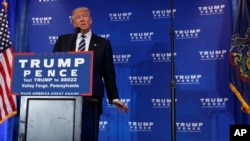Democrat Hillary Clinton and Republican Donald Trump rallied supporters Tuesday in states they see as crucial in the last week of their campaigns for the U.S. presidency.
Clinton is making stops in three cities in Florida, the sunny tourist mecca in the southeastern part of the country that Trump concedes he must win in order to take the White House in next Tuesday's election. A collection of recent surveys show him with a one-percentage point edge in the state, but the outcome there remains so uncertain that both candidates are making multiple visits there in the waning days of the contest.
Trump is visiting two states Tuesday where polls for months have shown Clinton with consistent advantages, Pennsylvania in the eastern part of the country and Wisconsin in the Midwest, in hopes of turning them in his favor to give him a path to the presidency before heading back to Florida on Wednesday.
National surveys continue to show Clinton, a former secretary of state looking to become the country's first female president, leading Trump, a brash real estate tycoon making his first run for elected office, by about two to four percentage points. U.S. presidential elections, however, are not decided by the national popular vote, but rather by the results from the voting in each of the 50 states and in Washington, the national capital, with the biggest states carrying the most weight in the overall outcome.
Based on the state-by-state outcomes, the winning candidate must amass at least a majority of 270 of the 538 votes in the Electoral College. Despite Clinton's narrow popular vote edge in political surveys, analysts give her a decided edge in Electoral College projections, with several showing her already with 270 or more votes because each state's electors are decided on a winner-takes-all basis.
Political scientist Alan Abramowitz, a long-time student of U.S. presidential elections at Emory University in Atlanta, told VOA that he does not see any of the 19 states and Washington, collectively with 242 electoral votes, that have voted for Democratic candidates in the last six presidential elections switching to Trump.
If that total materializes, Clinton would need just 28 more Electoral College votes to become the country's 45th president and replace President Barack Obama when he leaves office January 20.
Florida as key battleground
That is why Florida, with its 29 electoral votes, is such a key battleground election state and would be enough for Clinton to claim the presidency if she wins it and all the states that have voted Democratic since 1992.
Abramowitz predicted that, despite recent polling, Clinton would prevail in Florida. "The Hispanic vote will be heavily for Hillary Clinton," he said. "Trump is going to get clobbered" in that electoral niche.
The analyst said there is "a lot of stability" in U.S. voting patterns "despite the weirdness of the campaign," where Clinton and Trump have for months both claimed the other is unfit to become the U.S. commander in chief and voters hold unfavorable opinions about both of them.
Abramowitz said it is possible that 45 or more of the 50 states could vote exactly the same as they did in 2012, consistently for either the Republican or Democratic contender. He said it is possible that Florida and two Midwestern states, Ohio and Iowa, could flip to Trump after voters favored Obama, a Democrat, four years ago. Meanwhile, he said that two states, North Carolina in the mid-Atlantic region and Arizona in the west, that voted for Mitt Romney, the losing 2012 Republican contender, could end up in the Clinton column this time.
If that were to happen, Trump's gain compared to Romney in 2012 would not be enough to overtake Clinton.
Trump's need to win Florida, as well as flip states that Obama won in 2012, explains his Tuesday visits to Pennsylvania, where financially struggling laid-off factory workers might be receptive to his candidacy, and to Wisconsin, where rural dairy farmers and blue collar workers play an important role in the voting.
University of Virginia political analyst Geoffrey Skelley said Pennsylvania has "long been an attractive target for Republicans, but they haven't been able to win." He said Trump has not led any poll in either Pennsylvania or Wisconsin since both Republicans and Democrats completed their presidential nominating contests in July.
Abramowitz said that Trump "is still going to states that look like longshots. He has a pretty narrow or impossible path to 270" electoral votes.
Meanwhile, Clinton is headed Wednesday to Arizona, a state where the growing Hispanic population is opposed to Trump's tough anti-immigration stance and vow to build a wall along U.S.-Mexican border to thwart more illegal border crossings by Mexicans and immigrants from Central America.
Arizona has voted for Republican candidates in 15 of the last 16 presidential elections, but Clinton sees an opportunity to claim the state's 11 electoral votes and further dent Trump's chances of winning. Recent polls in Arizona show her with a narrow edge of less than a percentage point.
Polls inconclusive
One poll Tuesday, by The Washington Post and ABC News, showed Trump edging ahead of Clinton by a single percentage point in a four-way race with two fading candidates, Libertarian Gary Johnson and Green Party nominee Jill Stein, although both Abramowitz and Skelley discounted it since the same news organizations' poll recently showed Clinton with a commanding edge.
Trump heralded the same poll, saying on Twitter, "Wow, now leading in ABC-Washington Post Poll 46 to 45. Gone up 12 points in two weeks, mostly before the Crooked Hillary blow-up!"
Last week's announcement by Federal Bureau of Investigation Director James Comey that he is reopening the investigation into Clinton's handling of emails while she was the country's top diplomat from 2009 to 2013 has added an uncertain element into the final days of the campaign.
While the Post-ABC poll showed that Trump supporters are increasingly enthusiastic about voting for him in the days after the Comey announcement, other surveys have shown that Comey's decision has had little or no effect on support for either Clinton or Trump.
Comey ended a lengthy probe of Clinton's handling of national security material on her private email server in July, declaring that she was "extremely careless," but that no criminal charges were warranted. She has repeatedly said she made a mistake in the use of the email server based in her New York home, but that she did not knowingly send or receive classified documents in her emails, even though investigators found some were there.
Comey authorized the new probe after thousands of emails possibly linked to Clinton's State Department tenure were found on the computer of the estranged husband of a long-time Clinton aide, Huma Abedin. Investigators discovered the emails on the computer of disgraced congressman Anthony Weiner while probing accusations that he had sent lewd messages to a 15-year-old girl.







